 Petzlover
Petzlover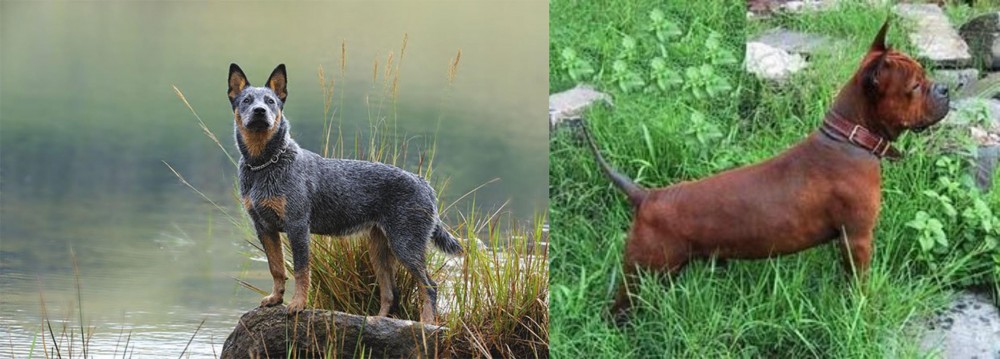 Blue Healer is originated from Australia but Chinese Chongqing Dog is originated from China. Both Blue Healer and Chinese Chongqing Dog are having almost same height. Both Blue Healer and Chinese Chongqing Dog are having almost same weight. Both Blue Healer and Chinese Chongqing Dog has same life span. Both Blue Healer and Chinese Chongqing Dog has almost same litter size. Both Blue Healer and Chinese Chongqing Dog requires Low Maintenance.
Blue Healer is originated from Australia but Chinese Chongqing Dog is originated from China. Both Blue Healer and Chinese Chongqing Dog are having almost same height. Both Blue Healer and Chinese Chongqing Dog are having almost same weight. Both Blue Healer and Chinese Chongqing Dog has same life span. Both Blue Healer and Chinese Chongqing Dog has almost same litter size. Both Blue Healer and Chinese Chongqing Dog requires Low Maintenance.
 It was in 1802 that George Hall arrived in New South Wales, establishing 2 cattle stations. He had a problem – getting his thousands of cattle to the Sydney markets. He began looking at the prospect of a droving dog and imported a number of dogs of which a blue mottled dog emerged.
It was in 1802 that George Hall arrived in New South Wales, establishing 2 cattle stations. He had a problem – getting his thousands of cattle to the Sydney markets. He began looking at the prospect of a droving dog and imported a number of dogs of which a blue mottled dog emerged.
The dogs were crossed with dingoes and by 1840 the Halls Heelers were used by the Halls. However with the death of one of the Halls, their cattle stations went to action and the dogs, the Halls Heelers became available.
The dogs attracted attention, and the term ‘Australian Cattle Dog’ was adopted. The name referred to those dogs coming from Thomas Hall's ‘Heelers’. There have been many arguments about the origin of the breed, but the red or blue offspring known as Hall's Heelers were proven cattle drovers, and with further breeding experiments which included the Australian Kelpie, dingoes and the Dalmation, by 1893, the tough, robust working breed known as the Blue Heeler or the Australian Cattle Dog came about.
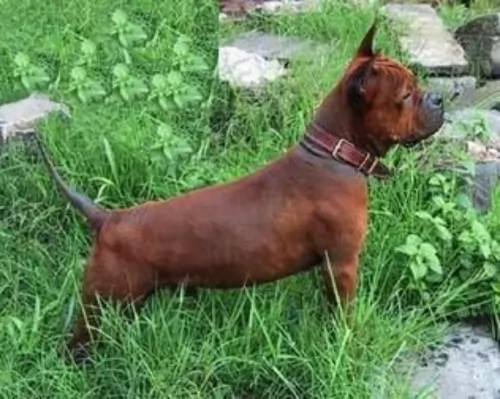 The Chinese Chongquing Dog is a very rare and unusual breed found only in China and now in Canada. The Chongquing is native to the city of Chongquing, China. This is an ancient breed that is believed to have lived in China over 2000 years ago during the Han Dynasty. It was a hunter and protector and still functions in those roles today., although there are very few left in China. Following the revolution and creation of the People’s Republic of China, the CQ Dog was only found in the rural areas of the country.
The Chinese Chongquing Dog is a very rare and unusual breed found only in China and now in Canada. The Chongquing is native to the city of Chongquing, China. This is an ancient breed that is believed to have lived in China over 2000 years ago during the Han Dynasty. It was a hunter and protector and still functions in those roles today., although there are very few left in China. Following the revolution and creation of the People’s Republic of China, the CQ Dog was only found in the rural areas of the country.
Pottery versions of the Chongquing Dog and burial figurines have been found in excavation sites from tombs of the Han Dynasty. In this isolated and mountainous area of eastern China, the dogs were unknown throughout the rest of China. Because of this the breed is relatively untouched by human intervention and is today about the same as it was 2000 years ago. There has been no interbreeding to change the natural evolution of the breed. They have their own unique personalities and temperaments.
At this time, it is believed that the Chongquing Dog is more endangered and rarer than the panda. Current breeding is diluting the breed as there are so few true bloods cross breeding and inbreeding is occurring. The knowledge of the exact breeds that contributed to the original Chongquing Dog was lost ages ago. The CQ Dog is known for loyalty, noble character, bravery and protecting its own. Today there is one kennel breeding these dogs outside China in Canada.
 Blue Heelers are medium-sized, sturdy, compact dogs who are somewhat longer than tall. The female Blue Heeler measures roughly 43–48cm at the withers, while the male measures about 46–51cm. If your Blue Heeler is in tip top condition, he’ll weigh about 15 to 22 kilograms. They are muscular with pointed, erect ears, dark eyes and long tails which are mostly hanging downwards. Their dense coats are blue- or red speckled and sometimes with tan markings.
Blue Heelers are medium-sized, sturdy, compact dogs who are somewhat longer than tall. The female Blue Heeler measures roughly 43–48cm at the withers, while the male measures about 46–51cm. If your Blue Heeler is in tip top condition, he’ll weigh about 15 to 22 kilograms. They are muscular with pointed, erect ears, dark eyes and long tails which are mostly hanging downwards. Their dense coats are blue- or red speckled and sometimes with tan markings.
The Blue Heeler is a ball of energy and he is clever too. You won’t find him sitting around for too long, and if there is sign of a walk or a ball game, he’s in! He is an independent dog, and although he makes a wonderful family pet, he tends to attach himself to that one special person in his life. He is a natural watchdog and protector of his human family.
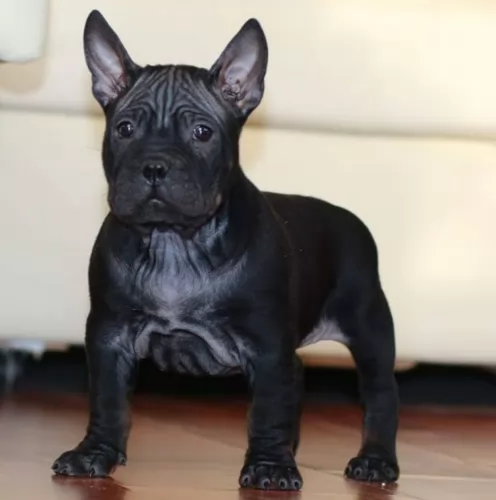 This breed is not well known, even in China. However, its likeness has been found in pottery dating back to the Han Dynasty. It is now beginning to be show in select dog shows. The general appearance upon which a current standard is being developed includes:
This breed is not well known, even in China. However, its likeness has been found in pottery dating back to the Han Dynasty. It is now beginning to be show in select dog shows. The general appearance upon which a current standard is being developed includes:
The Chongquing is a medium sized, compact and square dog that is powerful, muscular and strong. He is unique in appearance, tail and coat. His head is large, broad and flat. There are wrinkles from the muzzle to the forehead between his eyes. His eyes are brown, and the rims are black. He has high set, small ears that are triangle shape. Its frame is sturdy and strong. He is very muscular, and his strength and speed are explosive.
The Chongqing Dog can be one of three sizes: small, medium and large. All are hunters, but each hunted different prey. The appearance of all three sizes are proportionally the same.
 Training and socializing of your Blue Heeler will ensure that your dog does what you want him to. The Blue Heeler is an intelligent, responsive dog and training can benefit him, turning him into an outstanding family pet, good with children and other pets in the home.
Training and socializing of your Blue Heeler will ensure that your dog does what you want him to. The Blue Heeler is an intelligent, responsive dog and training can benefit him, turning him into an outstanding family pet, good with children and other pets in the home.
He is a playful, affectionate pet who doesn’t take easily to strangers, and this is what makes him such an excellent guard dog.
Your Blue Heeler is not an apartment dog as he requires a lot of exercise, and cooping him indoors for too long with nothing to do can lead to destructive behavior.
Head-strong, independent and robust, your Blue Heeler will need a firm owner who is boss. Add to the firm owner a lot of love and care, and you’ll have a devoted friend.
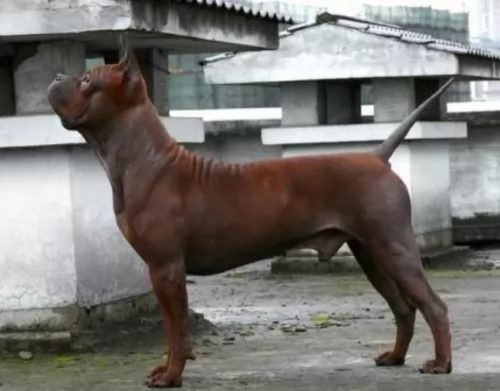 The Chongqing Dog is a confident, passionate, fearless and loyal dog. He is brave, alert, thoughtful and elegant. They make good companions for their people, but they are very wary of strangers and are ready to attack in order to protect their people. They are affectionate and loving with their people, including older children. They should never be off-leash in the company of other dogs.
The Chongqing Dog is a confident, passionate, fearless and loyal dog. He is brave, alert, thoughtful and elegant. They make good companions for their people, but they are very wary of strangers and are ready to attack in order to protect their people. They are affectionate and loving with their people, including older children. They should never be off-leash in the company of other dogs.
 Australian cattle dogs are healthy and can live up to 15 years of age, but even so there are some genetic conditions that you will need to be aware of following
Australian cattle dogs are healthy and can live up to 15 years of age, but even so there are some genetic conditions that you will need to be aware of following
Eye issues which includes progressive retinal atrophy – this disease is an inherited disease of the retina of the eye where the rod cells are destined to die. Fortunately it is not painful for the dog. There are different types of inherited retinal degenerative diseases in dogs but going into detail with them is beyond the scope of this article. For more information you can chat to your vet.
Recessive piebald elleles - the Blue Heeler has recessive piebald alleles which can produce white in the skin and coat and which is linked to congenital hereditary deafness.
 Remember that your Blue Heeler was once a full time cattle dog where he used to become totally and utterly exhausted from herding cattle. This is what he loved – the activity. If you have a Blue Heeler, you will need to provide him with plenty of exercise.
Remember that your Blue Heeler was once a full time cattle dog where he used to become totally and utterly exhausted from herding cattle. This is what he loved – the activity. If you have a Blue Heeler, you will need to provide him with plenty of exercise.
If you live on a farm, your Blue Heeler will be in his element because he can run, walk and swim to his heart’s content. If you keep your Blue Heeler in your back garden, you will need to provide him with ball games, rope games, long walks, running on a leash as you cycle and other activities.
Your Blue Heeler has a short, weather-resistant double coat. He’s not a heavy shedder, but he will have his share of seasonal shedding, so it’s a good idea to get into the habit of brushing him at least twice a week. This will get rid of all those loose hairs and keep his skin healthy by getting the blood flowing and distributing his natural oils.
Giving the best dog food for your Blue Heeler will come from either your home made food or a top quality commercially manufactured dog food. He is such a high energy dog, that your veterinarian can advise you on a dog food specially designed for high energy breeds.
These foods are well balanced and are enriched with amino acids and vitamins, promoting healthy bones and joints. Remember to include some raw meat into your dog’s diet and to ensure a constant source of cool, fresh water.
Ensure your Blue Heeler’s ongoing health by paying attention to ears, nails and teeth.
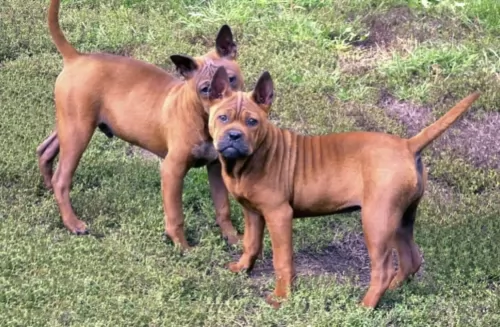 The best food for this dog is made yourself of human grade foods. Either raw or cooked yourself . This will keep their skin, teeth and coat healthy.
The best food for this dog is made yourself of human grade foods. Either raw or cooked yourself . This will keep their skin, teeth and coat healthy.
This is a really healthy breed especially due to the isolation and natural selection of their history.
He needs about 30 minutes of exercise today. He has no history of participation in canine games.